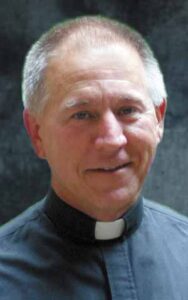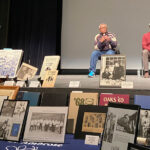By Fr. Bud Grant
Daunting barriers inhibit migrants trying to cross the United States. Even geese have issues with light pollution, human development on the ground and climate change. These flying wedges are such a normal feature of our seasons of transition that rather than reminding us of essential truths about the way nature works, they tend to lull us into a comforting, but illusory, sense that all is right with the world.

Quite sadly, this is not so. Ecosystems on either end of migration routes as well as all those across which they pass, must adapt to climate change in tight synchronicity with their seasonal inhabitants: imagine the geese arriving at their winter nesting grounds only to discover that their food supply is gone.
Nor are migratory species the only ones in stress. Because it fundamentally alters the essential characteristics of every ecosystem (excepting, perhaps, deep ocean hydrothermal vents), climate change impacts virtually every living species, forcing them all to migrate — even trees. Globally, flora and fauna are “on the move” as their native ecosystems become increasingly ill-fitted to their ancient adaptations.
In an eerily Tolkienesque way, more than 70 percent of tree species common to the eastern U.S. are ranging north as the ecological conditions that they require shift out from under their roots. It is a race against time.
According to one study, climate change induces migration toward the poles and higher elevations. Unsurprisingly, the biggest obstacle they face is human land use. They encounter roadblocks and bottlenecks that constrict, divert or alter their genetically encoded routes. In the Midwest, this means (mostly) agriculture. Elsewhere the problem is urban, suburban and exurban development (“Projected climate-driven faunal movement routes,” Ecology Letters, 2013 16: 1014-1422). The authors call for the creation of migratory corridors and have even mapped out the most plausible routes.
In short, anthropogenic climate change has set off the largest mass migration in history. If, on top of that, migration is stalled because of other human factors, a cascade event will be triggered which will utterly remake the world’s ecosystems, disrupt access to natural resources, endanger whole species and, ultimately, threaten human viability.
Humans are among those forced to become migrants. According to the UN Refugee Agency High Commissioner, “climate refugees” (a chilling neologism) have quadrupled in the past four years. These include a Native American tribe whose bayou is “slipping into the Gulf of Mexico.” They, too, need routes to new homes that are safe and open — free of barriers.
In his essay “Walking,” Henry David Thoreau employs words like “pioneer,” “sojourner,” and (my favorite) “saunterer,” for which he supplies a whimsical etymology. It may derive, he says, from “sans terre,” meaning “without land or a home… but equally at home everywhere” or from “sainte terre,” meaning the “Holy Land,” implying that every “saunterer” is a pilgrim (coincidentally, the Latin “peregrinus” originally meant stranger or wanderer but has come to mean “pilgrim”).
Thoreau insists that we are all “saunterers” amidst the “vast, savage, howling mother of ours, Nature.” This, he says, is good for our souls: “I enter a swamp as a sacred place — a sanctum sanctorum. There is the strength — the marrow of Nature.” Thoreau scoffs at sedentary occupations and urges us, for our health, to save the Wild, “and what I have been preparing to say is that in Wildness is the preservation of the world.” He advises us to “begin by burning the fences and letting the forest stand!”
The lesson given by our first “naturalist” is that we are all migrants — all migrating — all on spiritual pilgrimage through God’s creation, all “strangers and sojourners on this earth” (Heb. 11:13). This makes us kin to one another — to our sister and brother migrants — and to all God’s creatures. We owe ourselves a good saunter and, dare I say, we have a moral and spiritual obligation to construct welcoming corridors for our fellow migrants, not fences.
Je suis un migrateur.
(Father Bud Grant is a professor of theology at St. Ambrose University in Davenport.)











